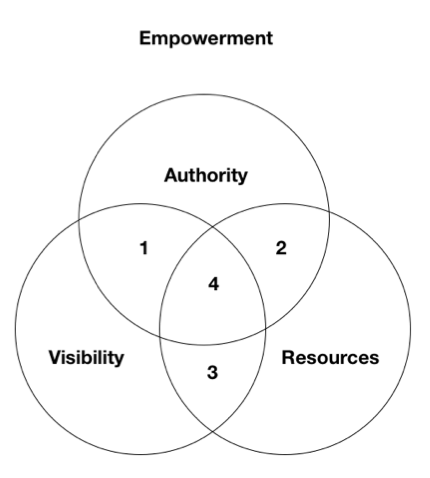[:en]Empowerment is like breathing. We all recognize its need but we’re rarely aware of it until something is wrong. Passivity in business is the most common symptom of lack of empowerment.
I define empowerment is the ability to affect business outcomes through one’s work. Managers often think that empowerment is a matter of giving people individual decision-making authority, but authority alone is not enough.
Real empowerment requires three essential elements, only one of which is authority. Share on X- Visibility of the business impact, resulting from one’s own work. Even if a person has an impact on a business outcome, if he or she cannot see that impact, it is as if did not happen at all;
- Resources, whether time, money, other people, know-how, technology and equipment; and finally,
- Authority over those resources and the will to wield it. I emphasize the last part because a manager who is unwilling to wield authority for whatever reason is the same as a manager with no authority at all, and perhaps worse.
So, for example, the CEO of a European fashion brand company empowers his senior managers to be “CEOs over their own parts of the business,” as he puts it. They have wide latitude in decision-making in using their own budget in achieving strategic results, and they have clear visibility through to those results. Another company’s customer service agents working at a call center have independent authority to resolve any customer complaint at their discretion up to a certain budget using agreed guidelines. Rapid resolution leads to happy customers and has reduced escalations by an order of magnitude. One of my Japanese client companies provides no fixed desk for sales staff, only shared hot desks. A salesperson may use his or her time however he or she wants in pursuing objectives. Presence in the office is required only for certain meetings.
When even one element of empowerment is missing, the result is enweakenment. I invented the word enweakenment because I believe it better communicates the damage done to organizational capability, as opposed to “disempowerment” which sounds too much like a reduction in authority.
For example, in another one of my client companies, sales teams had the authority to plan marketing activities and visibility through to results. However, marketing resources were concentrated in the hands of a marketing department, where people had their own ideas, that rarely coincided with those of the sales teams. Without resources, sales teams were not empowered. They were in fact weakened vis-a-vis their customers.
While the marketing people had the resources and authority over how to use them, they had little visibility to business outcomes. Sure, they would get the final sales numbers and consumer survey results, however, few marketing managers ever talked with customers directly to understand their needs and desires, or heard direct feedback from customers about the results of marketing activities. In fact, negative feedback was almost all the salespeople heard. If sales did not pan out, it was the fault of salespeople in the view of most of the marketing people, not their own. Without visibility to business outcomes, people have difficulty using authority and resources effectively, if they use them at all.
There are three distinct mentalities of enweakenment depending on which element of empowerment is missing, poverty mentality, silo mentality, and helplessness mentality, each of which leads to passivity in the business. Have a look at the diagram below.

- Authority and Visibility without Resources results in a poverty mentality. People can see the results on the business and have the authority to make a difference, but insufficient resources to do so, like the sales team above with the “authority” to plan marketing activities. People stop bothering even coming up with or otherwise reject out of hand ideas that might require even minimal investment in the business.
- Authority and Resources without Visibility results in a silo mentality. Expressions common to a silo mentality are ones like, “That’s the problem of the sales department, not my problem.” Silo mentality is common in back-office functions where staff and managers have little or no direct contact with customers or visibility to customer outcomes, like in the example of the marketing department above.
- Visibility and Resources with without Authority results in a helplessness mentality. People become frustrated and cynical in that they can see clearly what needs to be done and the availability of resources to make things right, but they have no authority over resources to do what is needed. Common expressions are ones like, “Don’t ask me. I just work here!”
Only number four in the middle of the diagram results in empowerment.
So, do you want to empower people your business? Think beyond authority. Ensure adequate resources whether that means time, money, people, equipment, or something else, and enable visibility through to results—particularly for people in back-office support functions. You will find that once you have truly empowered your people, they will empower you in return.
 [:ja]エンパワーメントとは、息をすることと同じく、何か普通ではないことが起きるまでその大切さをなかなか意識することはありません。ビジネスにおいて受動的になってしまうという徴候は、エンパワーメント不足が理由で起こることがもっとも多いのです。
[:ja]エンパワーメントとは、息をすることと同じく、何か普通ではないことが起きるまでその大切さをなかなか意識することはありません。ビジネスにおいて受動的になってしまうという徴候は、エンパワーメント不足が理由で起こることがもっとも多いのです。
私はエンパワーメントのことを、仕事を通してビジネスの出す結果に影響を与える能力であると定義しています。マネージャーはしばしばエンパワーメントとは決定権を人に与えることと考えているようですが、権限だけでは不十分です。
真のエンパワーメントには、3つの要素が必要であり、権限はその一つに過ぎない。 Share on X- 仕事の結果生み出されるビジネスへの影響がどれだけ目に見えるか。たとえビジネス結果に影響を与えようとも、それが目に見えるものでなければ、影響などなかったかのように思われます。
- 時間、金銭、他人のノウハウ、技術、機器といったリソース。
- そのリソースに関する権限と、それを行使する意思。最後の部分を強調しましたが、それは、権限を与えられてもそれを何らかの理由により行使しないマネージャーは、権限を持たないのと同じか、それよりひどいかもしれないからです。
例を挙げましょう。あるヨーロッパのファッション・ブランドを持つ企業でのことですが、そのCEOはシニアマネージャーのことを「我が社のビジネス内のそれぞれの部門のCEOである」と言い、彼らに対するエンパワーメントを行なっています。この会社のシニアマネージャー達は、戦略目的を達成するために与えられた予算を使う決定権を多岐に持ち、結果達成がはっきり目に見られるようにもなっています。また、別の企業では、コールセンターで働くカスタマー・サービスのエージェント達は社のガイドラインで定められている金額以下で収まる限り、顧客からのクレームの対処方法を決める権利を与えられています。迅速に対応すれば顧客に満足してもらうことに繋がりますし、クレームが膨らんでいく可能性を低くすることにもなります。私のクライアントである日本企業の営業部では、スタッフ個々のデスクはなく、ホットデスクと呼ばれるデスクの共有を導入しています。セールススタッフは目標達成の為の時間の使い方については自由に任されており、決まったミーティング以外でオフィスに来る必要はありません。
上記3つのエンパワーメントの要素のうちひとつでも欠けると、その逆のエンウィークンメントという結果になってしまいます。これは私の造語なのですが、この言葉の方が、一般にエンパワーメントの逆語として使われているディスエンパワーメントに権利の現象というニュアンスが感じられるのに比べ、企業の能力に与えるダメージをよりよく表していると思っています。
例えば、これはまた別の私のクライアント企業のケースですが、営業チームはマーケティング活動を計画する権利を与えられ、またその結果が見られるようになっていました。ところがマーケティングのリソースはその殆どがマーケティング部に与えられており、マーケティング部のアイディアは滅多に営業チームのアイディアと一致していないという状況でした。リソースなしでは、営業チームがエンパワーされることは無理です。ですので、顧客と向かい合っても実際に良い営業をする力を無くしていきました。
マーケティング部はリソースを持ち、それをどう使うかを決定する権利も持っていましたが、自分たちがもたらすビジネスの結果をはっきり見ることは殆どできませんでした。もちろん最終的な営業成績や顧客アンケートの結果はわかりますが、直接顧客と話してそのニーズや要求を理解しようとしたり、マーケティング活動の結果について顧客からダイレクトなフィードバックを聞いたりするマーケティングのマネージャーは殆どいませんでした。実際、営業スタッフが耳にしたのは、殆どネガティブなフィードバックばかりでした。営業がうまくいかなければ、それは営業スタッフのせいである、とマーケティング部は考えており、自分たちのせいであるなどとは思ってもいませんでした。ビジネスの結果がはっきり見えていない状況では、権利やリソースを効率的に使うことは難しいですし、全然使うことができないことさえあるのです。
エンパワーメントのどの要素が欠け落ちているかによって、3つのエンウィークンメント特有の考え方のどれかが見られます。それは欠乏感、孤立感、無力感の3つであり、このどれもビジネスにおける消極性に繋がります。下の図をご覧ください。

- 権限はあり結果も見られるが、リソースがない場合は、欠乏感を生む。 ビジネスの結果は見え、変化を起こすだけの権限も与えられているのに、そうするだけのリソースが不足している、つまり上記の例のマーケティング活動を計画する権限は持っている営業チームのような場合です。この場合、少しでもビジネスへの投資を必要とするようなアイディアを出したりすることはなくなり、またそのようなことがあってもあっさり却下してしまうでしょう。
- 権限とリソースはあるが、結果が見られない場合は、孤立感を生む。 孤立感で見られるのは、「それは営業ぶの問題であって、うちの問題ではない。」といったケースです。これがよく起こるのは、上記の例のマーケティング部のように、スタッフもマネージャーも直接顧客と接することが殆どなく、ビジネスの結果もはっきりわからないようなオフィスで仕事をしている部署です。
- ビジネス結果は見れれ、リソースもあるが、権限を与えられていない場合は、無力感を生む。 この場合、人々は何をする必要があるのかがクリアに見え、それを行うリソースも存在するのに、そのリソースを使う権限がないためにイライラし、皮肉っぽくなってくるのです。こう感じている人々がよく言うのが、「僕に聞かないでくれ。僕は単にここで仕事をこなしているだけなんだから。」という類のことです。
上の図の真ん中の4番だけが、本当のエンパワーメントを生み出すのです。
自分のビジネスにおいて、社員をエンパワーしたいとお考えですか。だったら権限以上のことを考えるべきです。時間でも金銭でも人でも機器でもそれ以外のものであっても、リソースを十分用意し、ビジネス結果もちゃんと見られるようにしておきましょう。オフィス業務をしている人々の場合はなおさらです。人々をエンパワーすれば、それは自分へのエンパワーメントとして還元されることがわかってくるでしょう。


